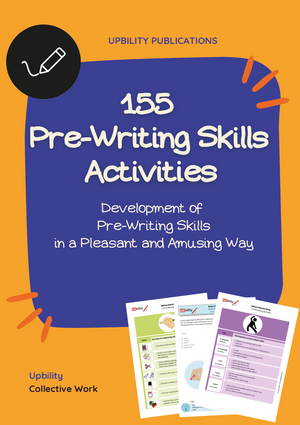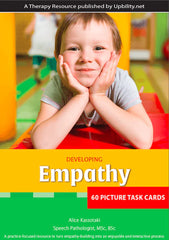
Autistic children: 10 surprising assets you need to know
Autism Spectrum Disorder (ASD) is a developmental condition that affects about 1 in 54 children in the United States, according to the Centers for Disease Control and Prevention (CDC). Η
ASD includes a wide range of symptoms, abilities and characteristics that can vary significantly from person to person. While many people focus on the challenges associated with autism, it is important to recognize and celebrate the strengths of autistic children as well.
Characteristics of autism
Autism, or Autism Spectrum Disorder (ASD), is a complex neurodevelopmental disorder characterised by a range of symptoms and behaviours that can vary significantly between individuals. The term "spectrum" refers to the wide range of challenges and strengths that autistic individuals may possess. Here are some common characteristics of autism:
Difficulties with social communication: Many autistic individuals have difficulty with verbal and nonverbal communication, which may include difficulties understanding social cues, maintaining eye contact, and interpreting facial expressions or body language. Conversations may be difficult to initiate or maintain, and some autistic individuals may have difficulties with pragmatics, such as understanding sarcasm, humour or idiomatic expressions.
Limited and repetitive behaviours: Autistic individuals often exhibit repetitive behaviors, which may include physical actions such as hand flapping, shaking or twisting, as well as repetitive speech or echolalia (repetition of words or phrases). They may also have intense preoccupations or special interests and may be deeply focused on particular subjects or objects.
Sensory sensitivities: Many autistic individuals have increased sensitivity to sensory stimuli, such as sounds, textures, tastes or smells. This sensitivity can lead to sensory overload or discomfort in certain environments and may result in avoidance of certain sensory experiences or a preference for certain sensory inputs.
Difficulty with changes and transitions: Autistic individuals often prefer routine and predictability and may find it difficult to adapt to changes in their environment or daily schedule. They may become anxious or overwhelmed when faced with unexpected disruptions or transitions.
Executive function challenges: Some autistic individuals have difficulty with executive function, which includes cognitive processes such as planning, organizing, initiating tasks, and self-control. This can lead to difficulties with time management, organization, and problem solving.
Difficulties with emotional regulation: Autism can be associated with difficulties in regulating emotions, which can lead to fainting or emotional outbursts when an autistic person becomes overwhelmed or frustrated. They may also have difficulty recognising and expressing their feelings.
Co-existing conditions: Autism often co-exists with other developmental or mental health conditions, such as ADHD, anxiety, depression or learning disabilities. These co-existing conditions can further affect the daily functioning and well-being of an autistic person.
In this post, we will explore 10 amazing strengths that individuals with pervasive developmental disorders often possess. By recognizing and nurturing these strengths, parents, teachers, and communities can help autistic children reach their full potential and live fulfilling lives.
1. Attention to detail
 Many autistic spectrum children have an exceptional ability to focus on specific aspects of a task or interest. They can notice details that others may overlook, which can be a valuable skill in a variety of areas. For example, an autistic spectrum child may excel at puzzles or games that require keen observation and pattern recognition. They may also have a heightened appreciation for the intricacies of art, music or nature.
Many autistic spectrum children have an exceptional ability to focus on specific aspects of a task or interest. They can notice details that others may overlook, which can be a valuable skill in a variety of areas. For example, an autistic spectrum child may excel at puzzles or games that require keen observation and pattern recognition. They may also have a heightened appreciation for the intricacies of art, music or nature.
This attention to detail can benefit children with autism in their education and personal interests. For example, a student who excels at identifying patterns in math problems may develop a passion for math and become proficient in that subject. Similarly, a child with developmental disabilities with a keen eye for detail may excel in art, photography or graphic design.
2. Visual thinking
 Many autistic people think with pictures and images, which is known as visual thinking. This skill can be beneficial in problem solving, as autistic children may be able to visualize possible solutions and evaluate their effectiveness without having to physically try them out. Visual thinking can also enhance creativity, as individuals with autism spectrum disorders can create unique ideas by mentally manipulating images and concepts.
Many autistic people think with pictures and images, which is known as visual thinking. This skill can be beneficial in problem solving, as autistic children may be able to visualize possible solutions and evaluate their effectiveness without having to physically try them out. Visual thinking can also enhance creativity, as individuals with autism spectrum disorders can create unique ideas by mentally manipulating images and concepts.
Visual thinking is a valuable skill that can be applied to a variety of fields, including engineering, architecture and design. Autistic children who excel in visual thinking may find success in these fields, where their ability to mentally construct and manipulate objects and spaces can be utilized.
3. Unique problem-solving skills
 Autistic children often approach problems from different perspectives than their neurotypical peers, leading to unique and innovative solutions. This extroverted thinking can be beneficial in many situations, especially when conventional methods are ineffective.
Autistic children often approach problems from different perspectives than their neurotypical peers, leading to unique and innovative solutions. This extroverted thinking can be beneficial in many situations, especially when conventional methods are ineffective.
For example, an autistic child may find an unconventional way to organize his or her belongings that is more effective and easier for him or her than the traditional method. Similarly, he may develop a new approach to a school project or assignment that demonstrates his creativity and originality.
4. Strong memory

Many autistic people have excellent recall skills, especially when it comes to details and information that interest them. This strong memory can be beneficial in education, as autistic students may excel at retaining facts and concepts learned in the classroom.
For example, a child with autism spectrum disorders with a passion for history may be able to recall specific dates, events, and names with ease, making them an excellent resource for classmates during group projects or classroom discussions. This strong memory can also benefit autistic children in their personal interests, as they may be able to quickly recall details about their favorite subjects or activities, contributing to their specialization and enjoyment.
5. Passion for special interests
Autistic children often have deep and focused interests in specific subjects, sometimes referred to as "special interests". These interests can be incredibly varied, from animals and art to technology and trains. People with autism can spend considerable time learning and engaging with their special interests, leading to a high level of specialisation and personal fulfilment.
Having a special interest can be a source of comfort and joy for autistic children, as it provides them with the opportunity to explore in depth a subject they are passionate about. In addition, special interests can also open doors to potential careers or hobbies in which they can excel. For example, an autistic child with a passion for coding may develop into a skilled software engineer or game programmer, while a child with a deep interest in marine life may pursue a career in marine biology or environmental conservation.
6. Honesty and loyalty
Autistic children are often known for their direct communication, which can be seen as a sign of honesty and integrity. They usually say what they think and feel without trying to manipulate or deceive others. This directness can contribute to strong relationships and build trust, as others can rely on autistic individuals to provide honest feedback and insights.
In addition to their honesty, autistic children can also be extremely loyal. They can form deep bonds with friends, family members, or even specific objects or places, and can be incredibly reliable and steadfast in their loyalty. These traits can make autistic children valuable friends and supporters, as they are likely to stand by those they care about through the hard times.
7. Resilience
Despite facing numerous challenges, autistic children often demonstrate remarkable resilience. They may experience difficulties in social skills, sensory processing, or communication, but many autistic children are able to adapt and overcome these challenges. This resilience can be seen as evidence of their strength and determination.
For example, an autistic child who struggles with social anxiety may gradually learn to cope with social situations by developing coping strategies and building a support network. Similarly, an autistic child with sensory sensitivities can find ways to manage their environment and create safe spaces where they can feel comfortable and secure. By acknowledging and celebrating their resilience, we can support autistic children to continue to grow and thrive.
8. Creativity
Autistic children often have unique perspectives and ideas that can lead to incredible creativity. Their unconventional thinking, combined with their attention to detail and visual thinking skills, can lead to innovative ideas in the arts, sciences and other fields.
For example, an autistic child with a talent for storytelling can create complex and imaginative worlds that captivate audiences. Another child may excel in scientific pursuits, coming up with groundbreaking hypotheses that advance our understanding of the world. By encouraging and nurturing the creativity of autistic children, we can help them share their unique ideas with the world and contribute to a richer and more diverse society.
9. Consistency and routine
Many autistic children thrive in structured environments and find comfort in consistency and routine. This preference for predictability can enhance productivity and well-being by allowing autistic children to focus on their tasks and interests without being overwhelmed by unexpected changes or disruptions.
For example, an autistic child who follows a consistent morning routine may be better equipped to start the day in a calm and focused state, setting the stage for success in school or extracurricular activities. Similarly, a predictable daily schedule can help autistic children manage their energy levels and avoid sensory overload or burnout.
10. Empathy and emotional insight
Although it is a common misconception that autistic individuals struggle with empathy, many autistic children actually have a heightened sense of empathy and emotional insight. They may be highly attuned to the emotions of others and deeply affected by the emotions of those around them. This heightened sensitivity can enable autistic children to form strong emotional bonds with others and provide valuable support and understanding to their friends and family members.
For example, a person with autism who is sensitive to the feelings of their peers can be an excellent listener and confidant, offering comfort and relief in difficult times. Their unique perspective on emotions can also allow them to offer guidance and advice that others may not have considered. By recognizing and nurturing this emotional insight, we can empower autistic children to use their empathic abilities to create meaningful relationships and make positive contributions to the lives of those around them.
Conclusion
In conclusion, it is vital for parents, educators and communities to recognize and celebrate the amazing strengths of autistic children. By fostering these strengths and promoting understanding and acceptance, we can help autistic children to reach their full potential and live fulfilling and successful lives.
As a society, we must continue to embrace neurodiversity and work to ensure that autistic individuals have access to the resources, opportunities and support they need to thrive. In doing so, we can create a more inclusive and compassionate world where all individuals, regardless of their neurological makeup, are valued and celebrated for their unique gifts and contributions.
Original content from the Upbility writing team. Reproduction of this article, in whole or in part, without credit to the publisher is prohibited.
Suggested Books on Special education :





